This gorgeous lullaby just landed.

This gorgeous lullaby just landed.

A pair of doctoral students at Hokkaido University, Japan, have published an extensive study on how listeners can affect performance. Haruka Shoda and Mayumi Adachi assess the negative effects of performer anxiety against the positive effects of so-called ‘social facilitation’ ad come up with an unequivocal conclusion.
Here’s how:
In Study 1, we prepared two types of recordings ofTräumerei performed by 13 pianists: recordings in front of an audience and those with no audience. According to the evaluation by 153 listeners, the recordings performed in front of an audience sounded better, suggesting that the presence of an audience enhanced or facilitated the performance. In Study 2, we analyzed pianists’ durational and dynamic expressions. According to the functional principal components analyses, we found that the expression of “Träumerei” consisted of three components: the overall quantity, the cross-sectional contrast between the final and the remaining sections, and the control of the expressive variability. Pianists’ expressions were targeted more to the “average” of the cross-sectional variation in the audience-present than in the audience-absent recordings. In Study 3, we explored a model that explained listeners’ responses induced by pianists’ acoustical expressions, using path analyses. The final model indicated that the cross-sectional variation of the duration and that of the dynamics determined listeners’ evaluations of the quality and the emotionally moving experience, respectively.
Read a full account of the study here.
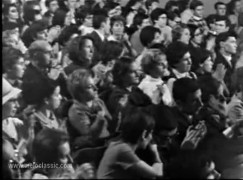
Announced today, leading Armenian musicians from around the world will commemorate the Turkish massacres of 1915 at a Wigmore Hall concert in July.
Taking part are:
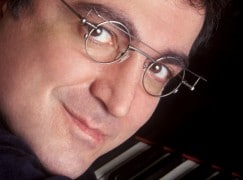
Here’s the announcement:
Australia will compete in the 2015 Eurovision Song Contest, to take place on 19, 21 and 23rd of May in Vienna, Austria. Just for once, and for many good reasons!
This year, the Eurovision Song Contest celebrates its 60th anniversary. To give the anniversary celebrations an extra dimension and to walk the talk on this year’s themeBuilding Bridges, the EBU and host broadcaster ORF invited Australia to compete in the Grand Final of the 2015 Eurovision Song Contest.
And the real narrative: Eurovision is losing relevance and audiences, its budgets spiralling out of control. It has long been a laughing stock. Will Aussie accession change that? Yeah, right…


Rob Knopper, percussionist of the Metropolitan Opera orchestra, is the wiz who keeps the musicians’ site far more interesting than the Met’s official online presence.
Rob is best mates with Billy Short, the principal bassoon. Billy can teach anyone to sight-read an opera in 10 easy tips.
Read here.
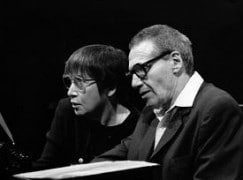
photo (c) Lebrecht Music&Arts
The Hungarian composer György Kurtag (pictured with his wife) has been named as the winner of this year’s premio Fundación BBVA de Música Contemporánea, worth 400,000 Euros.
Heavy snow in Rockland, Massachusetts, has brought the roof down at a music store that displays Liberace’s rhinestone-studded piano.
They’ll have to make a new one.
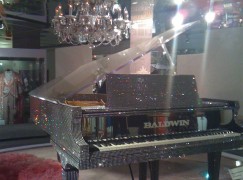
Next season there will be 10,000 tickets on sale at the Wigmore Hall for the equivalent of $8. It will enable you to hear the likes of Daniil Trifonov, Gidon Kremer, Patricia Petibon, Steven Isserlis and so on.
The catch? You have to be under-35. (Drat, just missed.)
Among other highlights of today’s seasonal announcements, an unknown pianist called Simon Rattle is making his Wigmore debut.

Latvia wants to present a ‘Grand Music Award 2014 for Lifetime Achievement’ to the conductor Mariss Jansons. But Mariss, music director in Amsterdam and Munich, is not seen much in Riga these days and his schedule is too crowded for him to make side-trips.
So the Minister of Culture Dace Melbarde is flying to Amsterdam today to give Mariss his gong at the Concertgebouw.

Four Grammy-winning members of the Seattle Symphony, on their way to Palm Springs, suffered a disagreeable setback when the Alaska Air plane turned around and was sent back to gate.
To keep their fellow-passengers happy, the four – violinists Mikhail Shmidt and Elisa Barston, violist Susan Gulkis Assadi and cellest Walter Gray – got out their instruments and played a quartet movement. The flight soon got lift-off.
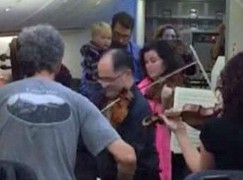
A young man went to hear the orchestra play music from The Godfather. He was surprised that many in the audience behaved like moviegoers (exactly the demographic the CSO and every other US orch is trying to attract). So he wrote a letter to the local paper:
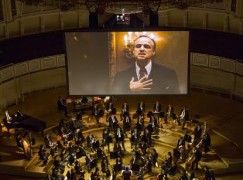
I think Chicago Symphony Orchestra concert goers need a refresher course on civility. Last night’s performance by the CSO, playing the score to “The Godfather,” was remarkable and very well played by the orchestra.
Unfortunately, the audience members, by and large, behaved like they were at a showing of “The Godfather” in Millennium Park. The transgressions ranged from constant chatter, cell phones ringing, cell phone use, sneaking in crinkly chips and candy wrappers and inexplicable laughter and cheering for once classic movie lines, now made into a gimmick by the audience. It was readily apparent most in attendance took neither the movie nor the performance seriously.
What bothers this writer most, however, is that nobody seemed to remember they were not at a viewing of “The Godfather,” but they were at the Chicago Symphony Orchestra, and while the audience ruined both, the disrespect for the performers was truly astounding.
The biggest atrocity of the evening came upon the closing scene of the movie. As the credits began to roll, the audience simply gathered their things, spoke at normal volume and proceeded out the aisle; perhaps unaware the lights remained off (due to the glow of their cell phones) and deaf to the Orchestra completing their performance (by those talking around them).
I am 26 years old. While I do not pretend to be a snob for high-art, I certainly know how to behave at performances. I hope those going to the encore performance tonight, or any other performance in the future, enjoy it. I also hope they can pay the orchestra and fellow audience members some respect and show up on time, sit, be quiet and put their phone away for a few hours.
— Thomas Carol, Chicago
The Sunday Telegraph published at the weekend a glorious hagiolatry of ‘Britain’s greatest living conductor’ by one of his cheery old chums, the cricket writer, Michael Henderson.
Today, it balances that effusion with a somewhat more sober assessment of Rattle’s future. Sample:
Rattle let me know of his resentment when, a dozen years ago, I named him “the Tony Blair of classical music”. Both men now risk being cast as desert-island survivors of a brief age known as Cool Britannia.
What Rattle does next is in his own hands. He is engaged in an intense flirtation with the London Symphony Orchestra and is campaigning for a world-class concert hall, something London has lacked for 75 years. If he signs on with the LSO, replacing the distracted Valery Gergiev, he will bring much-needed charisma to a scene that has lost its lustre. But Rattle insists he will not return to live in London; his third wife, the Czech mezzo Magdalena Kozena and their three small children are based in Berlin.
Rattle, who always scorned “long distance conductors”, risks becoming one himself. At 60, he remains partly undefined, between two stools, uncertain of his place in history.
Read on here.

photo: Chris Christodoulou/Lebrecht Music&Arts